1.教育题材 Education雅思
- 格式:doc
- 大小:236.00 KB
- 文档页数:21
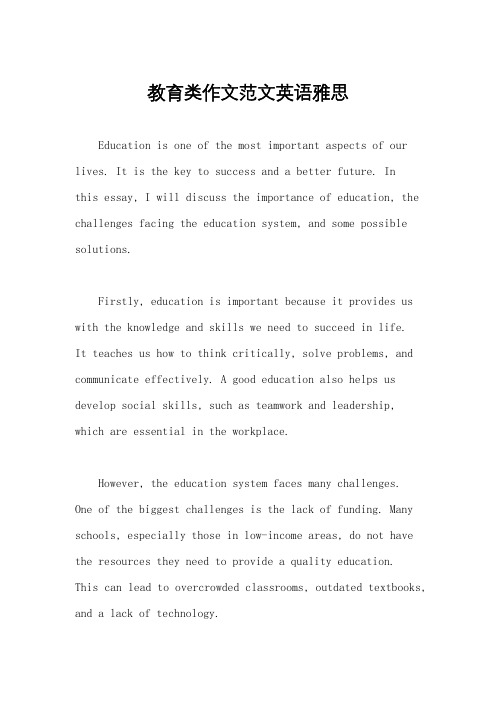
教育类作文范文英语雅思Education is one of the most important aspects of our lives. It is the key to success and a better future. Inthis essay, I will discuss the importance of education, the challenges facing the education system, and some possible solutions.Firstly, education is important because it provides us with the knowledge and skills we need to succeed in life.It teaches us how to think critically, solve problems, and communicate effectively. A good education also helps us develop social skills, such as teamwork and leadership, which are essential in the workplace.However, the education system faces many challenges. One of the biggest challenges is the lack of funding. Many schools, especially those in low-income areas, do not have the resources they need to provide a quality education.This can lead to overcrowded classrooms, outdated textbooks, and a lack of technology.Another challenge is the lack of qualified teachers. Many schools struggle to attract and retain highlyqualified teachers, especially in subjects such as math and science. This can lead to a lack of expertise in these areas, which can have a negative impact on students' learning.To address these challenges, there are several possible solutions. One solution is to increase funding for education. This could be done through government grants, private donations, or corporate sponsorships. With more funding, schools could hire more teachers, update their facilities, and purchase the latest technology.Another solution is to improve teacher training and support. Teachers need ongoing professional development to stay up-to-date with the latest teaching methods and technologies. They also need support from their colleagues and administrators to help them address the challenges they face in the classroom.In conclusion, education is essential for success in life. However, the education system faces many challenges, including a lack of funding and qualified teachers. To address these challenges, we need to increase funding for education and improve teacher training and support. With these solutions, we can ensure that all students have access to a quality education and the opportunity to succeed in life.。

雅思作文素材教育类雅思作文素材(教育类)写雅思英语作文,材料的积累也是很重要的,下面是店铺分享的雅思教育类作文材料,希望能帮到大家!雅思教育类作文材料When you choose a university,do you care more about its graduates' vocational development than its professors' fames? 选择大学,你更加关注就业前景还是教授名誉?1. Education is one of the key words of our time. A poorly-educated man, many of us believe, is an unfortunate victim of adversity, deprived of one of the greatest opportunities. 教育是时代的关键词汇,一个人没有受过良好教育,我们认为,是逆境的牺牲品,被剥夺了最宝贵的机会。
点评:谈及教育的重要性:2. Which is the chief aim of furthering one’s education in a university or college? 一个人进入大学进修学习的主要目的是什么呢?3. Those who are well-equipped with career-oriented knowledge and pragmatic skills will be more competitive in the future job-seeking. 学习以择业为导向的知识以及实用性的技能可以帮助一个人提高未来职业的竞争优势。
(重点背诵)4. To specialize in those job-related courses is a necessary preparation for one to enhance future job prospects. 在与工作相关的课程领域中变得精通是重要的就业准备,一个人可以提升就业前景。
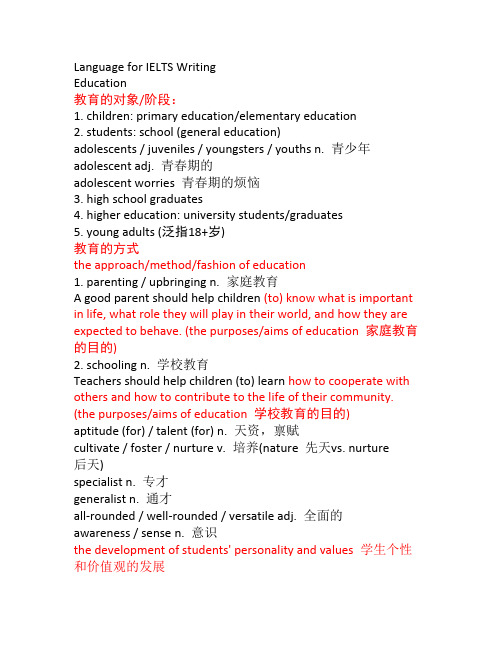
Language for IELTS WritingEducation教育的对象/阶段:1. children: primary education/elementary education2. students: school (general education)adolescents / juveniles / youngsters / youths n. 青少年adolescent adj. 青春期的adolescent worries 青春期的烦恼3. high school graduates4. higher education: university students/graduates5. young adults (泛指18+岁)教育的方式the approach/method/fashion of education1. parenting / upbringing n. 家庭教育A good parent should help children (to) know what is important in life, what role they will play in their world, and how they are expected to behave. (the purposes/aims of education 家庭教育的目的)2. schooling n. 学校教育Teachers should help children (to) learn how to cooperate with others and how to contribute to the life of their community. (the purposes/aims of education 学校教育的目的)aptitude (for) / talent (for) n. 天资,禀赋cultivate / foster / nurture v. 培养(nature 先天vs. nurture后天)specialist n. 专才generalist n. 通才all-rounded / well-rounded / versatile adj. 全面的awareness / sense n. 意识the development of students' personality and values 学生个性和价值观的发展mold (or mould 英式拼写) one’s character 塑造某人的性格mold (or mould 英式拼写) someone into something 把某人塑造成…..a (or the) the sense of responsibility (or duty / obligation) 责任感teaching students how to judge right and wrong and how to behave well (素质教育的具体内容)values and attitudes prevalent among someone 在某些人中普遍存在的价值观、态度help foster in the young the morally sound values and outlook on the world and life 帮助年轻人树立正确的价值观、世界观和人生观physical and psychological soundness (or well-being / welfare)身体和心理的健康promote the student’s physical, psychological (or mental), intellectual and emotional development 促进学生身体、心理、智力和情感的发展behave v. 行为举止behavior n. 行为举止a valuable member of society 有价值的社会一员make contributions to social progress 对社会进步做贡献contribute to social well-being (or welfare) 为社会健康发展做贡献achieve life value 实现人生价值pedagogy n. / pedagogical (or teaching) methodology 教学法=teaching methodeducational adj. 教育的,有教育意义的inspiring adj. 激励的,启发心灵的,鼓舞人心的impart knowledge (to someone) /inculcate knowledge (in / into / upon someone) 传授知识obtain (or acquire) knowledge and skills 获得知识和技能students’ command (or grasp) of something 学生对……的掌握a good command of English 良好的英语语言能力give someone an edge/advantage in 给某人某方面的优势motivated adj. 积极的,有动力的give students motivation to do something /motivate the students to do something给学生动力做某事initiative n. 主动性encourage sb. to take the initiative to do sth 鼓励某人积极主动做某事reasoning ability 推理能力analyzing skills and problem-solving ability 分析和解决问题的能力research skills 研究技能creative / original adj. 有创造力的creativity / originality n. 创造力creative thinking 创新思维critical thinking 批判性思维encourage students to think critically 鼓励学生用辩证的眼光看问题think independently 独立思考communication and social skills 沟通、社交能力team spirit 团队精神。

雅思写作真经词汇和例句【导语】雅思写作是检验考生英语表达能力和逻辑思维的重要环节。
掌握一些真经词汇和经典例句,有助于提升文章质量,赢得高分。
以下整理了一些雅思写作真经词汇及例句,供大家参考。
一、雅思写作真经词汇cation 教育类- facilitate 促进- transmission 传授- curriculum 课程- counterparts 同龄人2.Environment 环境类- sustainable 可持续的- conservation 保护- ecosystem 生态系统- carbon footprint 碳足迹3.Technology 科技类- innovation 创新- automation 自动化- cyber space 网络空间- artificial intelligence 人工智能4.Culture 文化类- diversity 多样性- heritage 遗产- preservation 保留- globalization 全球化二、雅思写作经典例句cation 教育类- Education should facilitate the development of individuals" potential rather than merely transmit knowledge.教育应促进个人潜能的发展,而不仅仅是传授知识。
2.Environment 环境类- It is crucial to take measures to achieve sustainable development and conservation of the environment.采取实现可持续发展和环境保护的措施至关重要。
3.Technology 科技类- The rapid development of technology has led to automation and innovation in various fields.科技的快速发展导致了各个领域的自动化和创新。

上海新航道培训学校/分析:雅思写作话题之教育类教育类1. 教育的内容,功能和作用母题:It is generally believed that education is of vital importance to the development of individuals and the well-being of societies. What should education consist of to fulfill both these functions? (050312)解题:只要说明教育的几个主要的组成部分(德智体美劳)及它们在对个人发展和整个社会的发展中起到怎样的作用即可,三个足矣,比如说教育应该包括智力教育:教授理论知识和技能(培养独立思考、创造性思考、分析和解决问题的能力,提高人际交流技巧,社会技能及适应社会的能力);“劳育”:为今后工作所需的实践技能;“德育”:提高道德标准,性格和正确价值观的培养;“体育”:提高身体素质,培养良好的生活习惯;“美育”:提高文明素质,提升文化素养及培养心理健康等。
子题:老师应该教学生如何判断是非还是学科知识?比起体育和艺术这些学科,学校更应该重视对将来工作来说更重要的学术科目吗?大学应当教授理论知识还是实践技能?中学阶段应当提供通才教育还是专才教育?大学的是应当把学生培养成合格的公民还是让他们自己得益?准备未来职业最好的方法是上大学还是尽快离校积累工作经验?国际新闻应该作为学校的学习科目吗?要不要学历史?小孩儿应该从小学习外语吗?无偿社区服务应该成为高中生的必修课吗?子题例1:Some people think that universities should provide graduates with the knowledge and skills needed in the workplace. Others think that the true function of university should be to give access to knowledge for its own sake. What, in your opinion, should be the main function of a university? (剑7 test 4;050528;070113)解题:本题主要讨论的是大学教育的功能和作用,是应该帮助学生就业,还是教授知识本身。
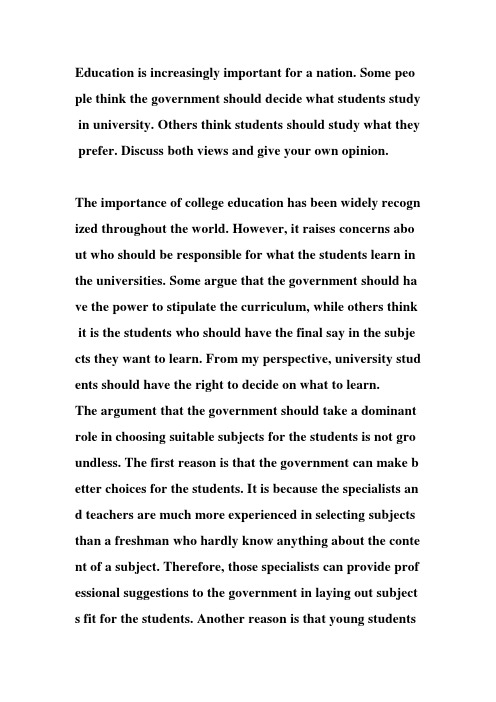
Education is increasingly important for a nation. Some peo ple think the government should decide what students study in university. Others think students should study what they prefer. Discuss both views and give your own opinion.The importance of college education has been widely recogn ized throughout the world. However, it raises concerns abo ut who should be responsible for what the students learn in the universities. Some argue that the government should ha ve the power to stipulate the curriculum, while others think it is the students who should have the final say in the subje cts they want to learn. From my perspective, university stud ents should have the right to decide on what to learn.The argument that the government should take a dominant role in choosing suitable subjects for the students is not gro undless. The first reason is that the government can make b etter choices for the students. It is because the specialists an d teachers are much more experienced in selecting subjects than a freshman who hardly know anything about the conte nt of a subject. Therefore, those specialists can provide prof essional suggestions to the government in laying out subject s fit for the students. Another reason is that young studentsare more or less lacking a sense of discipline. In such cases i f they were given a complete freedom in choosing what to le arn, it may lead to an irresponsible situation. For example, they may prefer an easier subject to a more difficult one. However, such an argument may underestimate the student s’ capabilities. In fact, the students should have the final de cision in the curriculum. One reason is that college students , the majority of whom are over 18, do have a basic level of judgment to what they need to learn in the universities. Thu s they should have the right to decide what is suitable for th em and be responsible for their own choices. Another reaso n is that the development of individual interests and skills c an be greatly enhanced if the students are allowed to make t heir own decisions. It is impossible for the government to ta ke care of the different characteristics of the students and make personalized plans for each of them. Only the student s themselves could decide on what to learn in accordance wi th their own interests and skills.To conclude, I personally think that students should have th e right to figure out the subjects they want to study in unive rsities. In addition, the government can make some effort to help them make right choices by offering the content of every subject.Rating: 7.5Reason: Only a few small errors. I understood everything y ou wrote and it was almost like reading the paper of someo ne who speaks English fluently. You did not repeat yoursel f at all so I do not feel like I need to show you how to say thi ngs in a different way. You did not have any mistakes with tenses or with the word, “the” which seems to be a large pro blem among English learners. I think you are ready to take the test!。

Nancy附录二十大话题教育类(education)pulsory education 义务教育2. vocational education 职业教育3. academic performance 学业表现4. non-academic affairs 与学习无关的事情5. puppy/ calf love 早恋6. corporal punishment 体罚7. tuition fee 学费8. parents’ supervision 父母的监督9. individual tutorship 个人辅导10. turning point 转折点11. the pursuit of knowledge 对知识的追求12. maintain / disrupt classroom order 维护、扰乱课堂秩序13. coeducational /single sex establishment 男女共校、单一性别学校14. generation gap 代沟15. indulge in 沉迷(表示“溺爱” 后面直接加宾语)16. play truant 逃学17. school shootings 校园枪击18. broaden one’s horizons 开阔视野19. the hardship and bitterness of life 生活的艰辛和苦难20. appropriate advice and guidance 恰当的建议和指导21. cultivate independence 培养独立性22. a good habit of frugality 节约的好习惯23. distinguish right from wrong 明辨是非24. shoulder the responsibility of 肩负…… 的责任25. be prone to do 容易做某事26. go astray 误入歧途27. violate social conventions and laws 违反社会习俗和法律28. cast a shadow on one’s heart 在心中留下阴影29. resist the temptation of 抵制……的诱惑30. interpersonal skills 人际交往的技巧31. peer pressure 同辈的压力32. formative years 性格形成期33. physically and emotionally immature 身心不成熟34. a sense of superiority 优越感35.socially adaptable 能适应社会的36. adjust teaching methods 调整教学方法37. exert a negative impact on 产生消极影响38. juvenile crime=juvenile delinquency 青少年犯罪juvenile delinquent 青少年犯罪者39. a sense of belonging 归属感40. qualified and experienced teachers 称职、有经验的老师41. first class teaching facilities 一流的教学设施42. education reform 教育改革科技类(science and technology)1.artificial intelligence 人工智能(artificial 人工的、人造的、非天然的)2.side effects 副作用3.technological revolution 科技革命4.nuclear weapons 核武器5.soil degradation 土壤退化6.industrial mass-production 工业化大生产7.enhance working efficiency and productivity 增强工作效率和生产力8.substitute for humans 替代人类9.intelligent machines 智能机器10.humanization 人性化11.unnerving problems 令人不安的问题12.eye-friendly 对眼睛无害的13.electronic innovation 电子革新14.global village 地球村15.industrial revolution 工业革命16.mechanization 机械化17.automation 自动化18.scientific discovery 科学发现19.cloning technology 克隆技术20.replica of an individual organ 人体器官的复制品an transplant 移植器官22.genetic defect 基因缺陷~ engineering 基因工程~ code 基因密码~ variability 基因变异23.ethically and morally wrong 有悖伦理道德24.space exploration 太空探索25.Global Positioning Systems 全球定位系统26.nanotechnology 纳米技术27.impersonal device 非人性化的设备环境资源类(environment and resources)1.environmental protection (conservation)环境保护environmental conservationist 环保主义者2.human activities 人类活动3.city dwellers 城市居民4.traffic congestion /traffic jam交通堵塞heavy traffic 形容交通拥挤5.disposable products 一次性用品ndfill 垃圾填埋场7.litter collection and disposal 垃圾收集和处理8.deforestation 砍伐森林9.greenhouse effect 温室效应10.acid rain 酸雨11.sand storm 沙尘暴12.solar energy 太阳能13.ban on plastic bags 禁塑令14.maintain the ecological balance 维持生态平衡15.eco-friendly/environmental friendly环保的16.natural disaster 自然灾害17.a natural evolutionary process 自然进化的过程18.short-term profit 短期利益19.sustainable development 可持续发展20.food chain 食物链21.diversity of life 生物多样性22.endangered species 濒危灭绝23.ozone layer 臭氧层24.forceful law and regulations 有力的法律法规25.raise people’s environmental awareness 增强人们的环境意识26.non-profit advertisement 公益广告27.dispose of the rubbish 处理垃圾28.the deterioration of the environment 环境恶化29.animal right activists 动物权益保护者30.wildlife preservation 野生动物保护31.survival of the fittest 适者生存32.turn a blind eye to 视而不见turn a deaf ear to 充耳不闻政府类(government)ernment administration 政府管理2.national defense 国防3.high levels of secrecy 高度机密4.financial strength 财力national revenue 国家财政收入national purse support 国家财政支持5.expand domestic demand/ need 扩大内需6.social undertaking 社会事业7.national public health system 全国公共卫生体系8.infrastructure 基础设施9.pilot project 试点项目10.feasible plan 可行的计划11.institutional innovation 体制创新12.economic return 经济效益13.financial crisis 金融危机(economic downturn / slowdown/ slump/ depression/)14.foreign direct investment 外商直接投资15.supporting measures 配套措施16.income gap 收入差距17.promote all-round, balanced and sustainable development of the economy and society 推动经济社会全面、协调、可持续发展ernment mechanism 政府机制19.reduce expenditure 减少开支curtail (vt) 削减20.a beneficial economic cycle 良性经济循环21.expand intra-county economics 壮大县域经济22.carry out the process of urbanization 推动城镇化23.public fitness program 公共健身运动bat the threat of violence to the general public 与对公众产生暴力的威胁斗争25.the true portrayal of what is happening around 是发生在周围事件的真实描绘26.strict regulation严格控制27.non-government sources 非政府渠道28.unshakeable duty (工作上)无法逃避的责任29.both financially and spiritually 经济上和精神上的30.put forward a number of possible solutions 提出一些可行的解决方法31.satellite towns 卫星城镇32.preferential policies to promote the construction of high-rise apartment buildings 优惠政策推动高层公寓住房的修建33.rapid depletion of social security fund and strained financial resources 社会保障资金的快速消耗和紧张的财政资源34.be overly financially dependent 过度的经济依赖35.physical inferiority 体力不支36.pension fund 养老金pension scheme 养老计划37.to downsize government budget 缩减政府预算38.shoulder the share of responsibility 承担共同的责任39.be better off 情况更好40.medical and educational service 医疗和教育服务41.to give top priority 列为重点42.a fair shake 一视同仁43.low-hanging fruit 容易实现的目标44.authorities 当局45.regulate/ administer/ oversee (vt.) 规范,管理46.implement 实施vt.47.legislate(vi)/ make laws 立法48.a democratic and progressive government 民主与开放的政府49.strictly prohibit/ ban v 严禁50.Stringent laws/ legislation 严格的法律51.rules and regulations 规章制度52.allocate money to sth/ subsidize (vt.)/ be a patron of / invest in/ finance(vt)/ fund(vt.)/ dedicate money to sth 为。
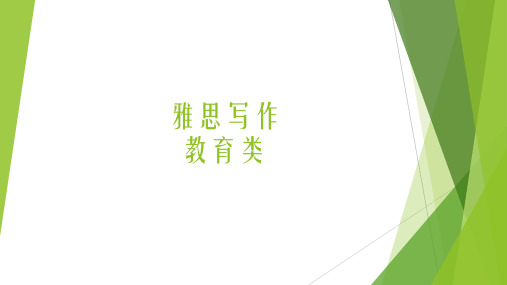

雅思作文教育类范文I believe that education plays a crucial role in shaping an individual's future. It not only provides knowledge and skills but also helps in developing aperson's character and values. 。
Education is the key to success, as it opens up opportunities for personal and professional growth. For example, when I was in high school, I had a teacher who encouraged me to pursue my interest in science. This support and guidance ultimately led me to study engineering in college and pursue a successful career in the field. Without the education and mentorship I received, I would not have been able to achieve my goals.Furthermore, education helps in fostering critical thinking and problem-solving skills. It teaches individuals how to analyze information, make informed decisions, and communicate effectively. These skills are essential in the modern world, where the ability to adapt and innovate ishighly valued. For instance, during my time in university, I was constantly challenged to think critically and present my ideas coherently. This has been invaluable in my professional life, where I often have to solve complex problems and communicate with diverse teams.In addition, education promotes social and emotional development. It teaches empathy, tolerance, and respect for others, which are essential for building harmonious communities. Through my own education, I have learned to appreciate diverse perspectives and engage in meaningful discussions with people from different backgrounds. This has helped me develop strong relationships and become a more empathetic individual.Overall, education is not just about acquiring knowledge; it is about shaping individuals into well-rounded and responsible members of society. It provides the foundation for personal and professional success, fosters critical thinking and problem-solving skills, and promotes social and emotional development.英文回答:我相信教育在塑造个人未来方面起着至关重要的作用。

教育的优点作文雅思Education, the cornerstone of an enlightened society, serves as a catalyst for personal growth, societal progress, and economic prosperity. Its multifaceted benefits extend far beyond the acquisition of knowledge and skills, permeatingevery aspect of our lives. In this essay, I shall delve into the myriad ways in which education empowers individuals and enriches our collective human experience. Firstly, education kindles the flame of intellectual curiosity within us,fostering a lifelong thirst for knowledge and discovery. Through exposure todiverse perspectives and disciplines, our minds are stretched and ourunderstanding of the world expands. It cultivates critical thinking skills,enabling us to analyze information objectively, form informed opinions, and make sound judgments. By nurturing our intellectual capacities, education empowers usto navigate the complexities of modern life and contribute meaningfully to society. Moreover, education plays a pivotal role in developing our emotional intelligence and social skills. It teaches us empathy, compassion, and cooperation, helping usto understand and connect with others. Through interactions with diverse groups of people, we learn to value different cultures, perspectives, and ways of life. This fosters tolerance, respect, and understanding, laying the foundation forharmonious communities and a more just and equitable world. Furthermore,education is an indispensable tool for economic empowerment. By equippingindividuals with the knowledge and skills necessary to succeed in the workforce,it opens doors to better employment opportunities, higher earnings, and greater financial security. Education levels the playing field, providing everyone with an equal chance to contribute to economic growth and share in its benefits. Itfosters innovation, entrepreneurship, and job creation, driving the engine of economic progress. However, the benefits of education extend far beyond the material realm. It enriches our lives by exposing us to the beauty of art, music, and literature. It cultivates our creativity, imagination, and self-expression. Education empowers us to appreciate the wonders of the natural world, instilling a sense of awe and wonder. It nourishes our souls, making us more well-rounded and fulfilled individuals. Furthermore, education has the power to transformsocieties. It is a powerful force for social justice and equality, breaking downbarriers of discrimination and creating opportunities for all. By empowering individuals with knowledge and skills, education enables them to participate fully in civic life, advocate for their rights, and hold their leaders accountable. It fosters informed decision-making, promotes transparency, and strengthens democratic institutions. In conclusion, the benefits of education are immeasurable. It empowers individuals, enriches our lives, and transforms societies. From fostering intellectual curiosity to developing emotional intelligence, from promoting economic prosperity to nurturing creativity, education plays a vital role in shaping our world. Investing in education is an investment in our future, a commitment to a more just, equitable, and enlightened society. Let us all strive to unlock the transformative power of education and create a world where everyone has the opportunity to reach their full potential.。
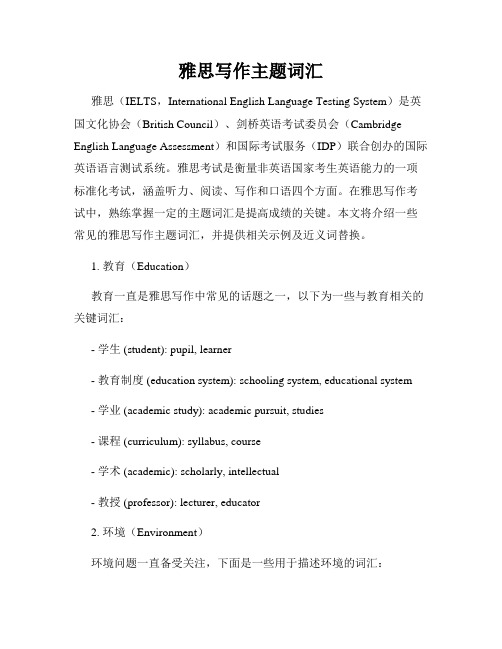
雅思写作主题词汇雅思(IELTS,International English Language Testing System)是英国文化协会(British Council)、剑桥英语考试委员会(Cambridge English Language Assessment)和国际考试服务(IDP)联合创办的国际英语语言测试系统。
雅思考试是衡量非英语国家考生英语能力的一项标准化考试,涵盖听力、阅读、写作和口语四个方面。
在雅思写作考试中,熟练掌握一定的主题词汇是提高成绩的关键。
本文将介绍一些常见的雅思写作主题词汇,并提供相关示例及近义词替换。
1. 教育(Education)教育一直是雅思写作中常见的话题之一,以下为一些与教育相关的关键词汇:- 学生 (student): pupil, learner- 教育制度 (education system): schooling system, educational system - 学业 (academic study): academic pursuit, studies- 课程 (curriculum): syllabus, course- 学术 (academic): scholarly, intellectual- 教授 (professor): lecturer, educator2. 环境(Environment)环境问题一直备受关注,下面是一些用于描述环境的词汇:- 污染 (pollution): contamination, environmental degradation- 垃圾 (garbage): waste, refuse- 可持续发展 (sustainable development): sustainable growth, environmentally friendly- 自然资源 (natural resources): natural assets, ecological goods- 气候变化 (climate change): global warming, climate crisis- 生态系统 (ecosystem): ecological system, environmental habitat3. 健康(Health)健康是每个人追求的目标,以下是一些用于谈论健康话题的词汇:- 预防 (prevention): avoidance, prevention measures- 疾病 (disease): illness, ailment- 营养 (nutrition): nourishment, dietary intake- 锻炼 (exercise): physical activity, workout- 心理健康 (mental health): psychological well-being, emotional balance - 健康饮食 (healthy diet): balanced nutrition, wholesome eating4. 科技(Technology)科技发展对社会产生深远影响,以下是一些描述科技的常用词汇:- 互联网 (internet): web, cyberspace- 数字化 (digitalization): digitization, computerization- 社交媒体 (social media): online platforms, digital networks- 创新 (innovation): creativity, invention- 自动化 (automation): mechanization, computerization- 人工智能 (artificial intelligence): AI, machine intelligence除了以上提到的主题词汇,雅思写作还涉及经济、文化、社会等各个领域的词汇。
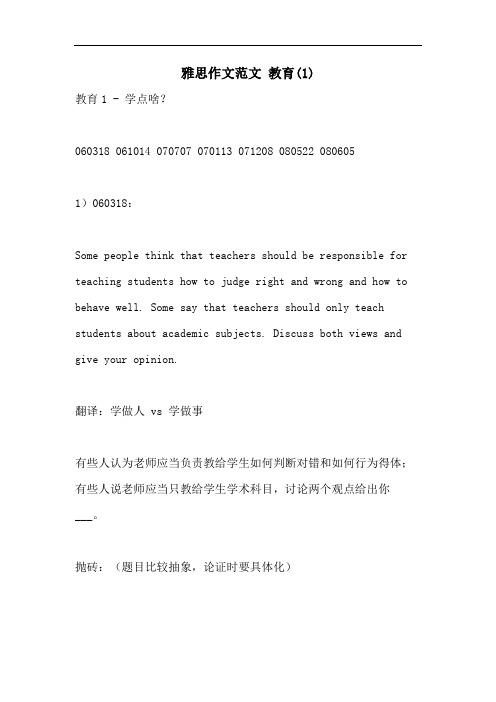
雅思作文范文教育(1)教育1 - 学点啥?060318 061014 070707 070113 071208 080522 0806051)060318:Some people think that teachers should be responsible for teaching students how to judge right and wrong and how to behave well. Some say that teachers should only teach students about academic subjects. Discuss both views and give your opinion.翻译:学做人 vs 学做事有些人认为老师应当负责教给学生如何判断对错和如何行为得体;有些人说老师应当只教给学生学术科目,讨论两个观点给出你___。
抛砖:(题目比较抽象,论证时要具体化)有些人觉得老师应当只关注(focus on)学术科目,这是老师的基本职责(fundamental responsibility),比如幼儿园(nursery school)和小学的识字、算术、美术、音乐、体育;中学的外语、物理、化学、自然、生物、历史、地理;大学的各种专业知识(specialist knowledge)。
但学生和老师相处时间长,除了学习学术科目,在为人处世方面也会潜移默化(unconsciously)地受老师影响(influence)。
所以,我认为老师也有责任教学生如何判断对错和行为得体,比如守时(punctual)是好习惯,而浪费是坏习惯;应当重视家庭,尊重长辈;应当相信工作,相信人,相信神(believe the God,西方人常见世界观之一)。
这些做人方面的内容(How to be a qualified citizen)对学生在未来职业的帮助甚至超过专业知识。
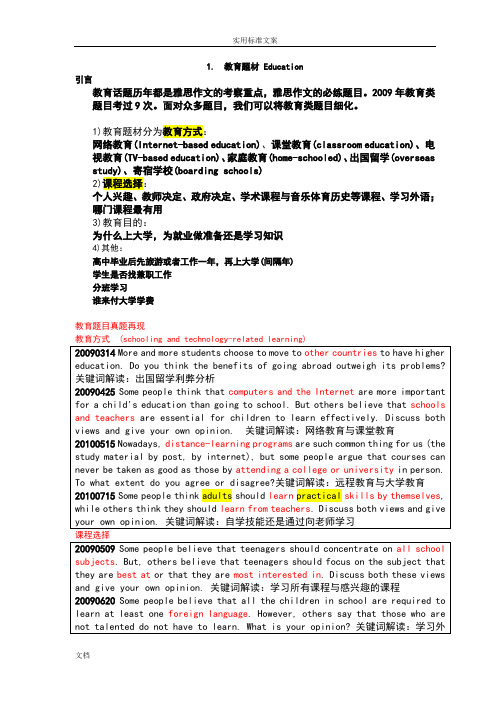
1.教育题材 Education引言教育话题历年都是雅思作文的考察重点,雅思作文的必练题目。
2009年教育类题目考过9次。
面对众多题目,我们可以将教育类题目细化。
1)教育题材分为教育方式:网络教育(Internet-based education)、课堂教育(classroom education)、电视教育(TV-based education)、家庭教育(home-schooled)、出国留学(overseas study)、寄宿学校(boarding schools)2)课程选择:个人兴趣、教师决定、政府决定、学术课程与音乐体育历史等课程、学习外语;哪门课程最有用3)教育目的:为什么上大学,为就业做准备还是学习知识4)其他:高中毕业后先旅游或者工作一年,再上大学(间隔年)学生是否找兼职工作分班学习谁来付大学学费教育题目真题再现课程选择链接机经关键词教育题目◎学校教育(schooling)与家庭教育(parenting)都是不可或缺的(indispensable),对于孩子的身心发育起着重要的作用(physical and mental development)。
家庭教育(upbringing)可以给孩子正确的引导和正确的世界观(guideline, direction, and right world outlook)。
学校教育的优势在于学生生活在集体的氛围中(environment),可以培养竞争意识、合作精神和独立性(cultivate sense of competition, sense of cooperation and independence)。
学生不仅是知识的接受者(information recipients),现在的学校大多是文化和社交活动丰富(culturally and socially diversified),理想中的学校应该是满足学生的全面发展的要求(development in an all-round way. Ideally,universities should attain/ achieve/ fulfill their goals if they tailor all the courses or programs to meet the needs of well-rounded development.)◎高等学校的功能,是为了未来就业(future career),还是学习(academic qualifications)。
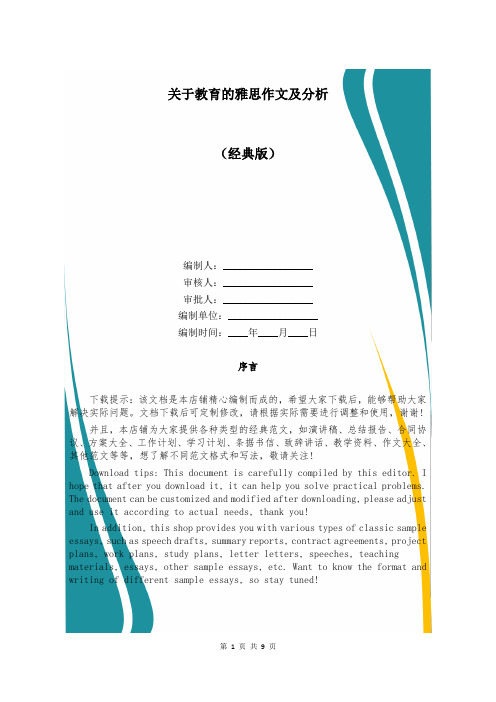
关于教育的雅思作文及分析(经典版)编制人:__________________审核人:__________________审批人:__________________编制单位:__________________编制时间:____年____月____日序言下载提示:该文档是本店铺精心编制而成的,希望大家下载后,能够帮助大家解决实际问题。
文档下载后可定制修改,请根据实际需要进行调整和使用,谢谢!并且,本店铺为大家提供各种类型的经典范文,如演讲稿、总结报告、合同协议、方案大全、工作计划、学习计划、条据书信、致辞讲话、教学资料、作文大全、其他范文等等,想了解不同范文格式和写法,敬请关注!Download tips: This document is carefully compiled by this editor. I hope that after you download it, it can help you solve practical problems. The document can be customized and modified after downloading, please adjust and use it according to actual needs, thank you!In addition, this shop provides you with various types of classic sample essays, such as speech drafts, summary reports, contract agreements, project plans, work plans, study plans, letter letters, speeches, teaching materials, essays, other sample essays, etc. Want to know the format and writing of different sample essays, so stay tuned!关于教育的雅思作文及分析教育是雅思写作非常爱考的话题了,话不多说,看看本店铺给大家分享的关于教育的雅思作文及分析。


雅思写作教育话题写作范文:In today's rapidly changing world, education plays a pivotal role in shaping individuals' future and society's development. Therefore, the topic of education has gained increasing attention. This essay will discuss several aspects of education, including its purpose, methods, and challenges.Firstly, education serves as a bridge to knowledge and a tool for personal growth. It equips students with essential skills and knowledge, empowering them to navigate their way through life successfully. Education not only provides students with academic knowledge, but also cultivates their critical thinking, problem-solving abilities, and creativity. It helps individuals discover their interests, passions, and talents, enabling them to pursue their desired careers with confidence and enthusiasm.Secondly, the teaching methods in education are evolving to meet the diverse needs of learners. In the past, education was often characterized by rote memorization and passive learning, which limited students' enthusiasm and creativity. However, modern education emphasizes interactive and student-centered learning. Teachers encourage active participation through group discussions, practical experiments, and project-based assignments. This approach fosters a positive learning atmosphere, where students feel motivated to explore and articulate their ideas, thus enhancing their skills in communication and collaboration. Nonetheless, education also faces several challenges. The firstchallenge is the increasing pressure on students. In order to excel academically, many students experience an overwhelming workload and fierce competition. This stress can affect their physical and mental well-being. Secondly, the accessibility of education is still unequal globally. While developed countries enjoy a well-established education system, many developing nations struggle to provide basic education to their citizens. This inequality hampers social mobility and perpetuates poverty.In conclusion, education is a crucial element in the development of individuals and society. It not only equips students with knowledge but also nurtures their personal growth and prepares them for the challenges of the future. While education has made significant progress in recent years by adopting student-centered teaching methods, it still faces challenges such as increasing pressure on students and unequal accessibility. It is imperative for governments, educators, and society as a whole to prioritize education and work together to overcome these challenges for the betterment of future generations.。

雅思英语作文教育类通用3篇雅思英语作文教育类 1It is often said that the subjects taught in schools are too academic in orientation and that it would be more useful for children to learn about practical __ such as home management, work and interpersonal skills.To what extent do you agree or disagree?Model Answer:A criticism often heard these days is that the subjects taught in schools tend to be too academic, and contribute little to preparing a young person for the real-life tasks he or she will have to perform after graduation. They say that academic subjects are rooted in the past, and are not useful for solving modern problems. I disagree with this point of view for three reasons.My first reason is that it is the duty of parents, not teachers, to prepare their children to deal with the practical affairs of life. The home, not the classroom, is the ideal place to learn about home management and interpersonal skills. As for work abilities and attitudes, they are best learned “on the job” and under thesupervision of an experienced older worker.My second reason is that academic subjects have withstood the test of time. They represent the accumulated wisdom of our ancestors down through the ages, and, far from being impractical, they equip us with the knowledge and confidence to make sound judgements about any problems which may crop up. In addition, academic subjects are good for training us in mental discipline, while practical subjects are weak in this regard.My third reason is based on the saying “Man does not live by bread alone.” Schooldays devoted solely to instruction in down-to-earth practical __ would be dull indeed! Lessons in the best literature of the world, and the epoch-making scientific and geographical discoveries of the past enrich our lives and make us feel that we are part of the great family of mankind.All in all, the teaching of academic subjects in schools is entirely appropriate. It is my firmly held view that practical subjects have no place in the classroom. On the contrary, the curriculum should be more academic!雅思英语作文教育类 2Some people believe that children leisure activities must be educational, otherwise they are a plete waste of time.Do you agree or disagree?Model Answer:Today, education has e a priority for many parents seeking to secure a good future for their children in this rapidly changing world. They believe that if their children apply themselves and work hard at school, then they will increase their opportunities for going to higher education and eventually getting a good job. Of course they are right, and as access to the best education and best jobs is ing more petitive, then it is true that children have to make the best of their study time when they are young.However, the parents who do not allow their children sufficient free time for leisure activities outside school hours, are misguided. Such activities are far from being a waste of time for the children simply because they are not academic. It is important to remember that children need to develop skills other than intellectual ones, and the best way to do this is through activities such as sports, games and playing with other kids. If they cannot play make-believe games, how can they develop their imagination? How can they learn physical co-ordination or learn important social lessons about winning and losing if they do not practise any sports? Many children form strong, personalrelationships with the friends they play with, and without the opportunity to do this, they could grow up emotionally immature or unformed.Finally, I think it is also important to remember that children need to relax as well as work. If everything they do must have some educational or academic relevance, then they will soon get tired of studying altogether, which is the last thing parents would want.雅思英语作文教育类 3Going overseas for university study is an exciting prospect for many people. But while it may offer some advantages, it is probably better to stay home because of the difficulties a student inevitably encounters living and studying in a different culture.To what extent do you agree or disagree with this statement? Model Answer:There is no doubt that going to study in a foreign country, with its different language and culture, can be a frustrating and sometimes painful experience. But while overseas study has its drawbacks, the difficulties are far outweighed by the advantages. Indeed, people who go abroad for study open themselves up to experiences that those who stay at home will never have.The most obvious advantage to overseas university study is real-life use of a different language. While a person can study a foreign language in his or her own country, it cannot pare with constant use of the language in academic and everyday life. There is no better opportunity to improve second-language skills than living in the country in which it is spoken. Moreover, having used the language during one's studies offers a distinct advantage when one is applying for jobs back home that require the language.On a university campus, the foreign student is not alone in having e from far away. He or she will likely encounter many others from overseas and it is possible to make friends from all around the world. This is not only exciting on a social level, but could lead to important overseas contacts in later professional life.Finally, living and studying abroad offers one a new and different perspective of the world and, perhaps most important, of one's own country. Once beyond the initial shock of being in a new culture, the student slowly begins to get a meaningful understanding of the host society. On returning home, one inevitably sees one's own country in a new, often more appreciative, light.In conclusion, while any anxiety about going overseas for university study is certainly understandable, it is important to remember that the benefits offered by the experience make it well worthwhile.。
1.教育题材Education引言教育话题历年都是雅思作文的考察重点,雅思作文的必练题目。
2009年教育类题目考过9次。
面对众多题目,我们可以将教育类题目细化。
1)教育题材分为教育方式:网络教育(Internet-based education)、课堂教育(classroom education)、电视教育(TV-based education)、家庭教育(home-schooled)、出国留学(overseas study)、寄宿学校(boarding schools)2)课程选择:个人兴趣、教师决定、政府决定、学术课程与音乐体育历史等课程、学习外语;哪门课程最有用3)教育目的:为什么上大学,为就业做准备还是学习知识4)其他:高中毕业后先旅游或者工作一年,再上大学(间隔年)学生是否找兼职工作分班学习谁来付大学学费教育题目真题再现教育题目◎学校教育(schooling)与家庭教育(parenting)都是不可或缺的(indispensable),对于孩子的身心发育起着重要的作用(physical and mental development)。
家庭教育(upbringing)可以给孩子正确的引导和正确的世界观(guideline, direction, and right world outlook)。
学校教育的优势在于学生生活在集体的氛围中(environment),可以培养竞争意识、合作精神和独立性(cultivate sense of competition, sense of cooperation and independence)。
学生不仅是知识的接受者(information recipients),现在的学校大多是文化和社交活动丰富(culturally and socially diversified),理想中的学校应该是满足学生的全面发展的要求(development in an all-round way. Ideally,universities should attain/ achieve/ fulfill their goals if they tailor all the courses or programs to meet the needs of well-rounded development.)◎高等学校的功能,是为了未来就业(future career),还是学习(academic qualifications)。
◎出国留学的益处和寄宿学校的优势在于培养(cultivate/ develop)学生的独立能力(independence)、适应能力(adaptability = the ability to adapt)、应对危机的能力(crisis-solving)、解决问题的能力(problem-solving)、建立友谊(build up friendship)、沟通的能力(communication skills)、建立良好的人际关系的能力(interpersonal relationship),独立思考的能力(independent thinking)。
科技与教育相结合◎远程教育(on-line learning)不能取代(replace/ take the place of)老师,而应是学校教育的补充(complementary approach),二者不是相互排斥的(they are not mutually exclusive)。
教师除了可以灌输知识(impart knowledge),还可以激励学生(give the students motivation/ emotional support),灌输高尚的道德观(instill high moral values),给学生以灵感(give the students inspiration),是学生的进步的促进者、导师、引导者和伙伴(facilitator, supervisor, guide and partner)。
老师的作用是通过面对面的交流(face-to-face communication),在课堂上提出引人深思的(thought-provoking)和予以人启迪的(enlightening)问题,甚至对学生的影响是深远的(far-reaching impacts),全面教育应该是道德教育、伦理教育和心理教育的结合(students need to be educated morally, ethically and psychologically)。
教育是解决问题的一个途径(分析解决型题目)education——国际援助话题——除经济援助(financial aid)外,还可以通过教育方式的援助——教育的援助会发挥很大的作用(make a huge difference),因为这有利于贫困地区的可持续发展(educational aid is a sustainable development)。
education——尊敬老年人、教师话题(students’poor behavior)——学生应该尊重师长(should be educated to respect the old and teachers),这方面提倡家庭的教育和引导(parentaleducation and guidance is recommended)。
education——大学生就业难的话题——工作难的一个原因可能是没有接受良好的教育(fail to secure a decent job because of the poor education) ——因而学生应该接受教育和工作培训,提升就业机会(receive good education and training program to increase thechances)。
education——青少年犯罪话题(some youngsters embark on the criminal road)——青少年要接受教育(offer them with adequate education)。
education——环境问题——提升保护环境意识(enhance the awareness of environmental protection)。
education——解决交通问题——增强人们的安全意识及遵守交通规则(cultivate the sense of safety, be educated to respect the traffic rules)。
词汇部分education n.教育,教育学,培养【同源词汇】educate vt. 教育;educated adj.受过教育的;educational adj.教育的【经典搭配】well-educated 受过良好教育的receive education 接受教育educational background 教育背景student-oriented education 以学生为主体的教育quality-oriented education 素质教育exam-oriented education 应试教育【考官例句】Education systems are based on the belief that all children can effectively be taught to acquire different skills.教育体制基于能够教会所有孩子各种技能的理念之上。
【句架提炼】…be based on the belief that…基于……理念之上schooling n.学校教育【同义表达】education n.教育;tuition n.学费,讲授【考官例句】Rather than breaking up family by sending children to study overseas, education authorities have been able to use the Internet to deliver schooling online.parenting n.父母对子女的养育【同义表达】home-schooling n. 在家教育【考官例句】Perhaps parenting classes are needed to help them to do this, and high quality nursery schools could be established that would support families more in terms of raisingnext generation. 也许需要设立家长课堂来辅助他们培养孩子,就抚养下一代而言,也应该建立高品质的幼儿园来辅助家长。
home schooling 在家教育,家庭学校【即学即用】Home schooling in modern sense is an alternative in developed countries to formaldistance-learning 远程学习【同义表达】on-line learning 网络教育【即学即用】Living in such an information-explosion era/ age, people can acquire/ obtain/ learn about knowledge from different approaches, such as watching TV, surfing the Internet,listening to lectures as well as the distance-learning.生活在信息爆炸的时代,人们可以通过各种途径来获取知识,如电视、上网、听讲座以及远程教育。
primary school 小学【考官例句】In many places today, children start primary school at around the age of six or seven.现在的很多地方,孩子在六七岁的时候就上小学了。
replace vt.取代,代替【注意与instead (of)区别】【同源词汇】replacement n. 更换;replaceable adj.可替换的;irreplaceable adj.不能替代的【同义表达】substitute vi.&vt. 代替;take the place of 代替【即学即用】If the schooling is replaced by the on-line learning, then the lack of personal interaction would become the major concern.如果学校教育被网络教育取代,那么最主要的问题将是缺乏师生间沟通。